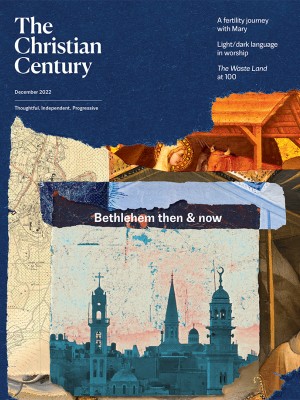December 4, Advent 2A (Matthew 3:1-12)
John the Baptist is calling for more than a cognitive recognition of wrongdoing.
My spouse and I have two young children, and we join the daily cacophony of adults who remind kids: tell the truth. Sometimes we even do it in that caring-but-we-mean-it voice our friends seem to have perfected in some secret parenting master class. When our kids get a bit older, I suspect their third- and fourth-grade teachers will guide them through “fact or opinion” worksheets just as my teachers did for me. As they journey through their teenage years and into young adulthood, I hope we’ll have the kind of conversations that help them be honest with themselves about who they are, where they find joy, and how they discern calling and vocation.
Adults pour a lot of energy into helping children and young people tell the truth. I think we do this because we know how difficult it is to discern and tell the truth in a world full of “alternative facts” and noisy, market-driven grabs at our attention.
Read our latest issue or browse back issues.
In our Gospel passage, John the Baptist offers an incisive word of truth in the form of information and an urgent imperative to follow. The information is that the kingdom of heaven has come near. The imperative is to prepare for the kingdom through repentance and baptism. As John relies on words such as vipers, wrath, and fire to make his point, the passage can ring with a haunting tone that seems disconnected from the Advent season in which we encounter it. However, it is important to recognize that at the heart of his message is a direct word that cuts through the noise: it is possible to be part of the kingdom of heaven here and now, and this calls for a way of being that reflects what Jesus is about.
In our society, in which it is common to argue about opinions like they are facts and dismiss verifiable data like it’s all a matter of opinion, hearing such a clear guide is hopeful good news. John’s urgent call to repent and be baptized is not just for a cognitive recognition of wrongdoing; it’s for an embodied reorientation of whole lives toward the way of Jesus. John may not yet fully understand what Jesus is about, but when we consider Jesus’ teachings throughout Matthew’s Gospel, we can be assured that John’s call is ultimately a liberating invitation to righteousness and justice, one that challenges the assumptions of the elite and prioritizes the cares and concerns of the excluded.
It makes sense that John is shocked and frustrated that Pharisees and Sadducees have found out about the baptism and are showing up at the Jordan. Despite their positional authority, many of them do not display the kind of life John sees fit for the kingdom of heaven. Some Pharisees pushed a heavy burden of self-sufficiency and performance on the community, while the Sadducees rejected the idea of resurrection—an idea that implied the assurance of justice for the poor and excluded. Representatives of either group might be out of step with the “people from Jerusalem, throughout Judea and all around the Jordan” who enter the waters out of a need for God’s help and a desire for hope.
So when John sees this unexpected and strangely paired group of religious leaders coming his way, he may be concerned that their presence will create fear and confusion among the crowd. He responds with the kind of truth telling befitting of a prophet dressed like Elijah.
John’s sharp words are instructive for the church today. In my research, I’ve found that many young people who leave Christian faith are in search of the kind of community they learned about in church. They have become deeply interested in the God found in scripture but have had too many encounters with churches or church leaders that seem to contradict that God. In many ways, they are leaving church to find church.
John’s words are intense, but they offer an insight we should take to heart: the lifelong work of discerning truth takes a commitment to bearing a certain kind of fruit. We find this fruit described in the Beatitudes. It is the fruit of mercy and peacemaking. It is hunger and thirst for justice and righteousness. It is a pure heart. It is courage and resilience to live the Jesus way.
As John points to the way of Jesus, he is pointing listeners to pursue deep, world-changing communion with communities that have been disenfranchised, ignored, and forgotten. How this looks for different listeners today will depend on our social starting points and the dynamics of our neighborhoods, but the direction is clear. It is truth worth telling.






